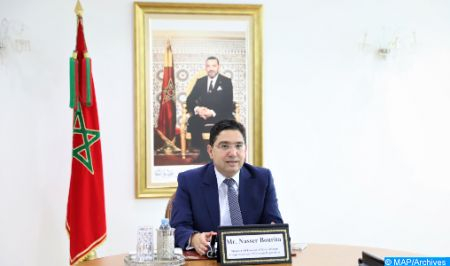FM Presents at Paris Conference Royal Approach for Resolution of the Libyan Crisis
Minister of Foreign Affairs, African Cooperation and Moroccans Abroad, Nasser Bourita, who represents HM King Mohammed VI at the Paris Conference on Libya, highlighted the Royal Approach for the resolution of the Libyan crisis and the Sovereign’s willingness to make Morocco a host country for the inter-Libyan dialogue. He noted that this approach, based on the respect of the Libyan will and the banishment of any paternalism, has allowed major advances initiated by the conclusion in December 2015 of the Skhirat Political Agreement. The Minister recalled that the Bouznika arrangements of October 6, 2020 allowed progress towards the reunification of the seven sovereign positions, that the inter-Libyan parliamentary congress of November 23, 2020 facilitated the meeting, for the first time since 2011, of 123 Libyan parliamentarians from the East and West, and that more recently, the Rabat Commitment of December 2020 converged the views of the Representatives of the House of Representatives and the High Council of State about the holding of the elections on the scheduled date of 24 December 2021. Bourita called on the participants in this conference to come out with strong and clear messages to Libya and the International Community. He also urged Libya to commit to a better future to preserve the progress made, stressing that the elections can transform the ceasefire into lasting peace and settle the issue of legitimacy. The minister emphasized, in this context, the need to ensure that the legislative framework of elections in Libya is “consensual” and “inclusive”, adding that these elections will strengthen the sovereignty of Libya and allow the international community to have a single Libyan interlocutor. After clearly expressing the support of the Kingdom of Morocco to the actions of the Government Abdel Hamid Dbeibah, the Minister recalled that Morocco is ready to support any agreement between Libyans. “Morocco is ready to support everything that Libyans will agree on, and this, the Libyan brothers know very well,” said Bourita who stressed the need for a transformation of the role of the international community and partners of Libya. “Morocco – which has remained a land of dialogue to which the Libyan brothers spontaneously converge – has always regretted that Libya is for some a “diplomatic business” and, for others, “an arena of struggle by proxy,” said Bourita, for whom “the only party that everyone must take is that of accompanying the united Libya – without heralds and without intrusions – to: establish the conditions for a lasting peace, including through demilitarization, the departure of foreign mercenaries and the reintegration of local militia; accompany Libya on the path of consolidating peace and strengthening the institutions of the rule of law; and help Libya to rebuild itself, through its own resources and through investments managed by Libyans themselves”. Finally, Bourita recalled the support of Morocco to the efforts of the UN Secretary General, Antonio Guterrres and his Personal Envoy Ján Kubiš for the consolidation of peace in Libya.

